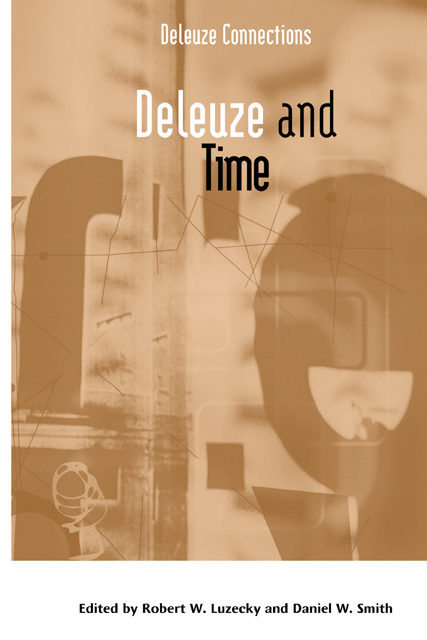3 - The Pure Form of Time: Deleuze’s Theory of Temporality
Published online by Cambridge University Press: 13 April 2023
Summary
Deleuze argues that a fundamental mutation in the concept of time occurred in Kant. In antiquity, the concept of time was subordinated to the concept of movement: time was a ‘measure’ of movement. In Kant, this relation is inverted: time is no longer subordinated to movement but assumes an autonomy of its own, becoming the pure and empty form of everything that moves and changes. In what follows, we will examine how the inversion of the relation between time and movement came about, and how Deleuze’s own theory of time builds on Kant’s revolution and extends it further.
Originary, Aberrant and Ordinary Time
1. Originary time: the ancient coordination of extensive and intensive movement
For the ancients, the concept of time was subordinated to the concept of movement. Aristotle, in the Physics, writes that time is the measure or ‘number of movement’. A day is a unit that measures a single revolution of the earth on its axis (the movement from sunset to sunset); a month measures a single revolution of the moon around the earth (a cycle of the moon’s phases); a year measures a single revolution of the earth around the sun (a cycle of the seasons). But since there is a plurality of movements, there is necessarily a plurality of times. When a lion chases a gazelle, the different movements of each animal cannot be said to unfold in a homogeneous time. Each movement has its own duration, its own articulations, its own divisions and subdivisions; in subduing the gazelle, the lion incorporates the gazelle into its own movements, its own time. This heterogeneity of movements is equally true of celestial bodies, and the complex history of the calendar is a history of attempts to coordinate and impose order on these heterogeneous movements (see Aveni 1989). Given the heterogeneity of movement, the ancients were led to ask the question: Is there something immobile or invariant, outside of movement – or at least a most perfect movement – through which all other movements could be measured? Is there a movement of movements in relation to which all other movements could be coordinated – a great celestial schema, or what Leibniz might have called a kind of ‘metaschematism’?
- Type
- Chapter
- Information
- Deleuze and Time , pp. 45 - 72Publisher: Edinburgh University PressFirst published in: 2023



